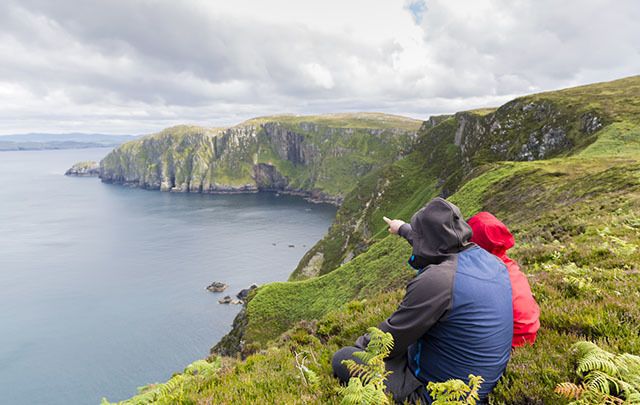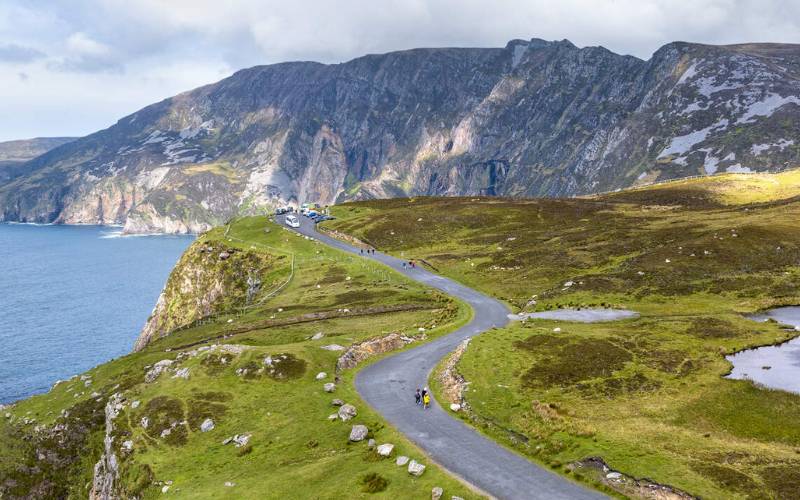Ireland saw over 10 million visitors in 2016, making it a record-breaking year for Irish tourism, and according to Tourism Ireland, 2017 looks to be even better.
In 2016, 10.5 million people visited the island, up almost 1.5 million from 2015, with tourists spending €5.4 billion while they were here, the Irish Times reports.
Niall Gibbons, CEO of Tourism Ireland, said "It is clear that 2016 will be another record-breaking year for Irish tourism.”
“We have seen exceptional results from North America for January to November – up more than +18% on the same eleven-month period in 2015. I also welcome the strong increase in British visitors (over +11%). And Mainland Europe has also turned in another excellent performance (almost +9%), with important markets like Spain, France and Germany all recording good growth.”
In November, National Geographic Traveller (UK), declared Donegal the "coolest place on the planet.”
Editor Pat Riddell said that a panel of the magazine’s contributors “considered many destinations for our Cool List 2017. But we felt Donegal was in a real sweet spot – off-radar and hard to access, but on the cusp of a breakthrough.”
“On the one hand, you have big pushes like the Wild Atlantic Way and the recent visit of Star Wars; on the other you only have to drive a few miles to have a beach or a road completely to yourself . . . there’s an array of reasons to visit, from surfing beaches in Magheroarty and Ballyhiernan Bay to Horn Head – a driving, walking of cycling loop that squeezes the 1,600-mile Wild Atlantic Way into a 4.5-mile nutshell,” says the magazine.
New on #NGTUK... We reveal The Cool List: our 17 must-see destinations for 2017 https://t.co/63JFHrAw4u
— Nat Geo Traveller (@NatGeoTraveller) December 1, 2016
However, travel writer Fionn Davenport, the author of several editions of the Lonely Planet guide to Ireland, says: “Star Wars has been huge in terms of chat, but given that the numbers to the Skelligs are strictly controlled and dependant on weather, I don’t think it’ll make a huge difference to tourism numbers overall.”
He says “Ireland’s traditional strengths – scenery, people and the ‘experience’ of coming here” are the real and enduring draw.
“It sounds a bit hokey to us, but to a visitor the idea of a wander around some monastic ruins or a walk along some scenic cliffs followed by a night of live music by a bog fire is intensely appealing,” he says.
“There is a gap between how we see ourselves – as a modern land of motorways and macchiatos – and how others see us – a traditional country with stunning landscapes and warm, welcoming people who speak English and are fond of enjoying themselves.”
Hotel occupancy in Dublin also reached record levels in 2016, and demand in the capital city is set to remain high in 2017 due to a hotel bed shortage, the Irish Times reports.
According to the Irish Tourist Industry Confederation (ITIC), Dublin is going through a “capacity crunch” and needs close to 5,000 new hotel bedrooms to satisfy demand. The shortage in hotel rooms not only affects tourists, it also makes it more difficult for the city to attract overseas conferences.
Another worry for many in the tourism sector is the potential impact Brexit will have on Irish tourism in the coming year.
Speaking at a tourism conference, Minister for Tourism Shane Ross, said: “We know that the result of the UK referendum on EU membership may bring challenges for tourism in 2017. Therefore, it will be more important than ever that Ireland stands out as a top tourist destination in our key overseas markets.”
Joe Dolan, president of the Irish Hotels Federation, described tourism as “one of the shining lights of the Irish economy” but said that the economic uncertainty for UK travelers following Brexit means growth rates from Britain would likely not be sustained.
Tourism Ireland welcomes exceptional 11% growth in overseas visitors for January-November 2016 https://t.co/mWf679opRI pic.twitter.com/FZs5U8DiNb
— Tourism Ireland (@TourismIreland) December 21, 2016
“There are good reasons to be optimistic about our key North America and European markets in the coming year,” he said. “However, there are signs that growth is slowing out of the UK market. While it is too early to say what the effect of Brexit will be, the uncertainty and the fall in the value of Sterling will pose challenges.”
Following Brexit, Tourism Ireland has significantly increased its marketing budget towards audiences in North America and mainland Europe for 2017.



Comments